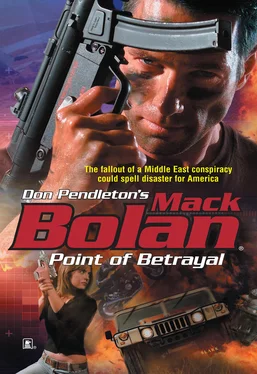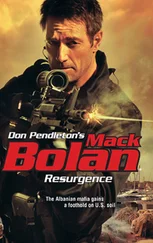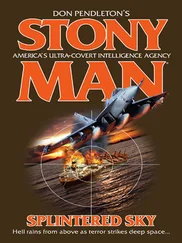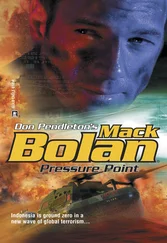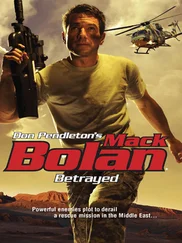Abdullah knew he and his crew were living on borrowed time. During the past five minutes, his teammates, using a lethal mix of knives, garrotes and poisonous darts, had slain ten Iraqi soldiers, each identified as Republican Guard by the red triangle on his shoulder patch. With the area pitched into darkness, Abdullah had donned a pair of night-vision goggles, plunging his world into green. Four more soldiers closing in on the building, all of them Egyptian mercenaries recruited for the job by Jon Stone, were similarly equipped and considerably more dangerous than Abdullah could hope to be.
The soldier cleared his throat. The sound snapped Abdullah from his thoughts, caused his shoulders to tense. Using a handheld television with a tubular camera lens protruding from it, he snaked the lens around the carrier’s front end, caught a glimpse of the soldier. The man stood, staring straight ahead, apparently fixated on a grove of date palms situated fifty yards ahead. The soldier held a wicked-looking SMG in his left hand, its barrel canted at a forty-five-degree angle as he scanned the area.
Abdullah watched as the soldier pulled a walkie-talkie from his belt, raised it to his mouth. Setting down the television, the young Arab rose up in a crouch, trying hard not to jostle his MP-5 or other equipment as he did. Blood thundered in his ears, making it harder to hear the soldier’s transmission.
“Position ten,” the soldier said.
A pause, followed by a muffled response reached Abdullah’s ears.
“All clear,” the soldier said.
Relief washing over him, Abdullah snatched up the television, secured it on his belt, listened. The soldier had turned and was moving back toward the main building. Rounding the carrier’s front end, Abdullah fell in behind the soldier, closed the distance between them with just a few steps. Reaching around, digging fingers into the man’s fleshy jowls, he gave his adversary’s head a twist and dragged the knife blade across the man’s throat, severing muscles, tendons and arteries.
Blood spurted from the gash and he went limp, dead before he hit the ground.
Sheathing his knife, Abdullah let the soldier fall into a heap. Folding the man’s arms and legs in on his torso, the young Arab stuffed the soldier underneath the armored troop carrier, bunching his remains behind the tires so he’d be less visible.
Returning to his feet, Abdullah stared at his hands. The warm blood glistened bright green on his palms. His stomach rolled with nausea and his head momentarily grew light as the enormity of his actions struck him. He’d killed a man, willingly, mechanically. For a moment the realization and the physical sensations overshadowed everything else around him.
A voice exploded in his earpiece. “Abdullah! Left!”
The young man whipped around, bringing up the sound-suppressed weapon as he did. He spotted a pair of shadows approaching. Each brandished an assault rifle, the barrel tracking in on Abdullah. Without thinking, he triggered the MP-5, drilled the man closer to him with quick burst to the abdomen. Even as he did, his second attacker fired his own weapon, the muzzle-flash tearing a hole in the darkness, the report shattering the silence. Even as Abdullah tried to process the sounds, recognize them as gunshots, he whirled toward the second attacker. He cut loose with another burst from his weapon, simultaneously felt something grab hold of him, stop him cold. Pain seared through his right arm even as the gunshot registered in his mind. His knees buckled, slammed hard against the concrete.
The soldier, face obscured by night-vision goggles, readjusted his aim. Abdullah willed his arm to rise, realized it no longer responded to his commands. Streams of gunfire ripped through the air overhead, causing him to flinch. A storm of bullets ripped into the Iraqi soldier, pounding him back several steps, burrowing into the man’s body armor, but stopping short of his flesh. Although not mortally injured, Abdullah saw the man whipsawed about by the bullets’ force. Another burst smacked into the man’s face, knocking him backward as though tackled from behind.
A pair of Abdullah’s comrades, both Egyptian mercenaries, raced from the shadows and helped him to his feet while a third stayed behind the troop carrier and laid down cover fire. Weapons chatter and muzzle-flashes erupted around Abdullah. Bullets sizzled just past his head, chewing through concrete and ricocheting off the armored hide of the vehicle at his back.
He felt fingers slip into his shirt collar. Someone dragged him to his feet, roughly.
“Go,” said one of the mercenaries.
Abdullah nodded, backpedaled toward cover. Even as he did, he used his good hand to snatch the Beretta 92-F from his hip, snapped off three shots at another soldier. The first two rounds flew wild, screaming past the man’s head. The third, fueled by sheer luck, drilled into the man’s mouth, tunneled through his spinal cord before exploding from the back of his head.
His arm throbbing, his head lightening with blood loss, Abdullah continued moving. God had smiled on him with that last shot, that much he knew. He triggered the pistol again, watched muzzle-flashes pop lighter green in his field of vision. With the Egyptians’ guidance, he made it behind the large troop carrier.
“You’re okay?” the mercenary asked.
Abdullah nodded. “I can treat this myself.”
“You’re lucky,” the man said. “The bullet came out the other side. But you’re losing a great deal of blood.”
Abdullah waved him away. “Fight. We came here to fight.”
The mercenary grinned. “Yes, we did. And I came here for a paycheck. Unfortunately we find ourselves at odds.”
The man jabbed the barrel of his pistol into Abdullah’s forehead. Abdullah raised a hand to swat it away but never connected. Then his world went black.
Amman, Jordan
TARIQ RIYADH SAT at a table in the corner of the hotel bar, nursed his third whiskey. The hotel catered mostly to Westerners and a pianist tapped out an old jazz standard, the melody competing with the dull din of collective conversation, broken only by an occasional burst of laughter. Riyadh watched as the cigarette pinched between the first two fingers of his right hand, burned down to the filter. Discarding it, he lit another. What the hell? he thought. I have plenty of time.
A big man dressed in a summer-weight navy-blue suit, eyes obscured by a pair of mirrored aviator shades, drifting through the crowd. Clutching a glass mug of amber beer, he approached Riyadh’s table, dropped into a chair without invitation. Anger burned in Riyadh’s face, knotted his stomach, as he stared at the man, who was looking past him at a wall. With his eyes hidden and his mouth set in a neutral line, Jon Stone was as inscrutable as ever.
“They’ve killed more than three hundred,” Riyadh said. “The entire team, except for the mercenaries, are dead. They’ve also been hunting down members of their families, killing the men. I’ve lost four cousins and two nephews within the last week. One of them was twelve”
“Sorry,” Stone said, not meaning it.
“Sorry? Sorry gets me nothing.”
Stone shrugged and swallowed more beer. “It happens, man. You knew the risks going in. You don’t like how it worked out? Tough shit.”
“You knew the mission had been compromised.”
“We suspected. There’s a difference.”
“Without distinction.”
“Did you know the Egyptian mercenaries had gone rogue?”
“Maybe.”
“But you went anyway. Why?”
“Orders.”
“Whose?”
“None of your damn business.”
Riyadh thought for a moment of the 9 mm Smith & Wesson hidden under his light jacket, discarded the notion. He couldn’t shoot Stone, not here, not now. Even if he could best the man in combat, he knew he’d never make it out of the lobby without being arrested or shot by the armed guards protecting the hotel. Neither was an acceptable option. He had too much to accomplish.
Читать дальше
